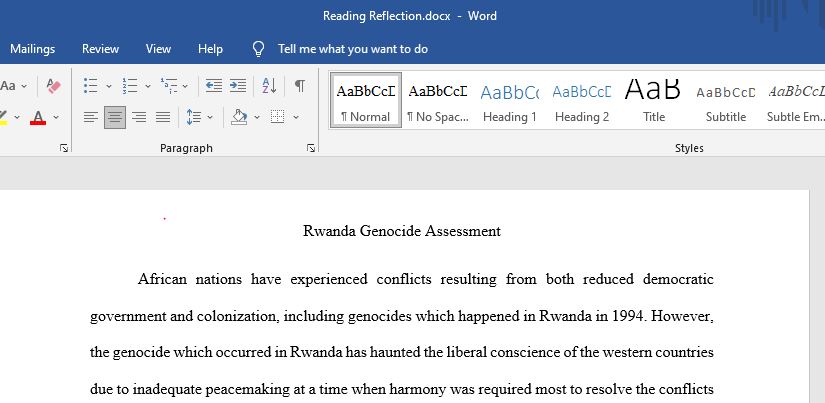Reading Reflection Assignment-Rwanda Genocide
Reading reflection or MODEL UN Reflection
Reflections are engaged responses to a required reading. Students who
would not attend the full day Model UN exercise at the Camperdown campus
will select one required reading from sessions 3, 4, OR 4 of the course and
write a reflection of 600 words on the chosen reading. You are advised to
select a secondary source and not a primary source, as the latter tend to be
considerably more difficult to analyse/critique in a reflection.
Students who will attend the OPTIONAL Model UN exercise held at the
University of Sydney (Saturday, 17 April, 10-5 pm), will be able to choose to
partake instead in the Model UN reflection assessment (see further below)
instead of a reading reflection.
Option 1: A Reading Reflection
If you are writing a reading reflection, you can briefly summarise the main
point of the text in 3-4 sentences, but should devote the rest of your response
to your critique of the reading (what key concepts did you learn or revisit,
which parts of the author’s argument were most compelling, which were weak
or you had disagreed with, what thoughts did the paper stimulate for you, what
connections do you observe between this and other readings, etc.). You do
not need to comment on every aspect of your chosen text; i.e. it is often better
to select a couple of themes (maximum three) and comment on them in
greater depth than to try to engage with everything in the text at the cost of a
more superficial discussion.
Criteria for assessment:
1. Provision of accurate and concise summary of the reading
2. Creative or novel thinking about the issues under examination supported by
logic/reason/evidence or other academically accepted tools
3. Integration of relevant information from outside the article/lecture (including
personal experience), provided the information manifestly helps to support
your argument, or what you would like to say
4. Clarity of ideas and expression
5. Ability to develop and present a thoughtful analysis within the required word
limit (reflections exceeding the word limit by more than 10% will incur a
penalty)
Option 2: A Model UN Reflection Report
If you will be attending the Model UN exercise at the University of Sydney on
Saturday 17 April you can choose to partake in a short oral assessment,
during which you will reflect on your experiences of the day: i.e. the
challenges and opportunities of achieving international consensus on a UN
reform proposal, in the context of competing national interests of UN member
states. You should base your discussion on your observations and address
key questions which will be provided to you on the day of the Model UN. The
purpose of this assignment is to build on the Model UN and strengthen your
understanding of the complexity of achieving a UN reform. It is also intended
to increase recognition of the scope for imaginative national engagement in
the process of reform and the possibility of significant incremental
improvement within UN forums.
Criteria for assessment:
1. ability to identify key political factors and influences affecting the positions
of states on reform issues such the UN Emergency Peace Service
2. ability to recognise and analyse the challenges and opportunities facing
UN member states in reaching consensus on UN reform proposals such
as the creation of a UN Emergency Peace Service
3. evidence of learning from your observations and experience of the Model
UN exercise
4. thoughtful and intelligent analysis and arguments drawing on ideas from
other sources, most notably: Courtney Smith (2006) Politics and Process
at the United Nations: The Global Dance
Answer preview:

word limit:603
